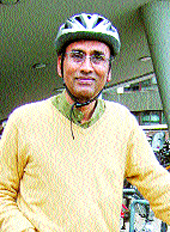
London, June 29: Sir Venkatraman Ramakrishnan may be a Nobel Prize winner, a knight of the realm and the president-elect of the Royal Society but he has taken on a well-nigh impossible task: he wants Indians to stop putting their faith in astrologers.
He dismissed astrology as downright "dangerous".
He wants science teachers in India to tell their students that astrology is plain and simple rubbish and they should instead place greater reliance on logical and rational thought.
"Vast numbers of Indians consult astrologers - you might ask what is the big problem with consulting astrologers," he said. "Well, if you are the Prime Minister or a high-up politician and you consult an astrologer, all you have to do is find out who the astrologer was and you could bribe the astrologer to produce the kind of horoscope you wanted. It is very dangerous apart from the fact it has no truth to it. It is very dangerous to indulge in these practices."
"Venki", as the 63-year-old professor prefers to be called, has spoken to members of the Indian Journalists' Association about how he wants to improve links between India and the Royal Society, the world's foremost organisation for leading scientists.
Venki moved from America to Cambridge 16 years ago and has been based at the Medical Research Council's Laboratory for Molecular Biology (LMB) where he says he has done "some of the best work of my life".
As far as India is concerned, the Royal Society's first Indian president in over 350 years may turn out to be quite radical in an understated way.
Narendra Modi and Sushma Swaraj may take to Venki who wants, for example, science textbooks to be made widely available in vernacular Indian languages. At least, he did not say Sanskrit.
"It is not good enough for the top one per cent of Indians who speak English to go round talking to each other in English about these issues - you have to reach the masses and you have to do that through the vernacular languages," he declared. "We need good textbooks in the vernacular languages."
The journalists forgot to ask Venki about yoga but he wants to set about changing India's scientific culture.
Venki, who admitted he has been a "sceptical scientist", said he has given talks in the past in which he had argued that "it is much more productive to have logical and rational approaches to problems. You haven't a hope of having them solved if you believe in things like astrology or homeopathy. Then effectively you are avoiding the problem."
Why he dragged in homeopathy is not clear but he urged Indian scientists to teach their students "about science and scientific method and against irrational beliefs".
"India is a slightly schizophrenic country in that it is the only country whose Constitution says that the country should encourage a scientific temper - there is no other country which is constitutionally required to encourage a scientific temper," he observed. "And yet, despite the best efforts of people like Nehru who involved scientists like Homi Bhabha and many others, the average scientific temper in India is not, in my opinion, improved."
Venki intends combining the life of a working scientist, tucked away in his lab, with his duties as president. "I told the Royal Society I am going to spend two days a week in London but the rest of the week I will be available by email and telephone. The one thing I told them is that I intended to continue directing my research in Cambridge - that I did not want that to be derailed and that was okay with them. In fact, they said that having someone who is a working scientist actually sets a good example so that you don't just become an official or an administrator."
He said: "I am the joint head of my division at the LMB which takes a fair amount of time and I am going to step down after a five-yearly review at about exactly the same time as I take on the Royal Society job so it will be switching one administrative duty for another."
Having Venki as Royal Society president for the next five years might well help India to move into the fast lane as far as science research is concerned.
He gave examples of greater collaboration: "What I would like is to encourageboth short-term and long-term visits - for instance, often a student(in the UK) is doing a project which involves (collaboration with) particularly Indiancolleagues or (help with a) pathogen and may require a certain expertise (from India). It would make perfect sense for them to come (to the UK) and join that technique."
"In my own field I am currently trying to encourage India to get into electron microscopy," he continued. "Someone who is highly skilled at this technique is in great demand even in the West but I was able to persuade a very bright young Indian scientist that he should consider returning to India and he is considering seriously moving to Bangalore."










